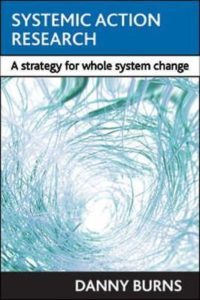 Today I’ve been working on how to incorporate action learning into action research. We’re running a Mission Pilot Project which was put on hold briefly because of the COVID-19 situation. I already had a broad research design, but the action research process needed more work. The challenge is how to integrate practical theological reflection within the learning processes of the various stakeholders in such a way that it is part of the action research.
Today I’ve been working on how to incorporate action learning into action research. We’re running a Mission Pilot Project which was put on hold briefly because of the COVID-19 situation. I already had a broad research design, but the action research process needed more work. The challenge is how to integrate practical theological reflection within the learning processes of the various stakeholders in such a way that it is part of the action research.
I’ve been really helped by Danny Burns’ Systemic Action Research which I picked up on sale for $10 some time ago. His focus is on learning in action, not just learning from action. He recognises that in action research there is the primary researcher, those with whom they are engaged in action, and the larger system within which they live or work. [“System” here is seen as perceptual and fluid rather than institutional and rigid.] Burns’ focus is on how systemic change happens, and he questions a number of assumptions about change as a planned, linear process.
What did I learn from him?
To work on how people attend to their experience, and to help them express this in aesthetic ways before jumping to propositional knowledge.
To pay attention to the group dynamics that allow or support improvisation. Burns uses the metaphor of theatre to discuss improvisation. I’ve read and used other work in a similar vein. More on this later.
To encourage multiple, parallel experiments rather than requiring consensus on one way forward. “Creativity emerges more through travelling alongside and interacting with difference than through premature integration.” Change can come through seemingly contradictory actions that can reinforce each other in non-linear ways.
To focus on resonance more than representation. Improvisation relies on people joining in an emerging direction because it resonates with them, not because they are required to participate in some way. They get it. They’re energised. Importantly, “change is fired by the passion of people who are motivated to act on what they believe in. More people will do more things, more insight will be generated, and more possibilities emerge where passion is at the heart of the process.”
Burns also talks about improvisation and action learning being narrative, hence action learning loops back to earlier experiences and understandings in order to make sense and move forward.
I didn’t quite find the methodical answers I was looking for, but these insights are super helpful for my thinking about design. Burns has a lot to say, and lots of examples, about large scale systemic change through action research.
Leave a Reply